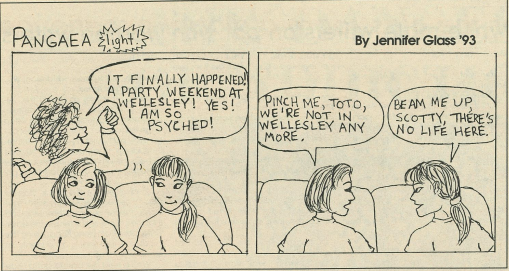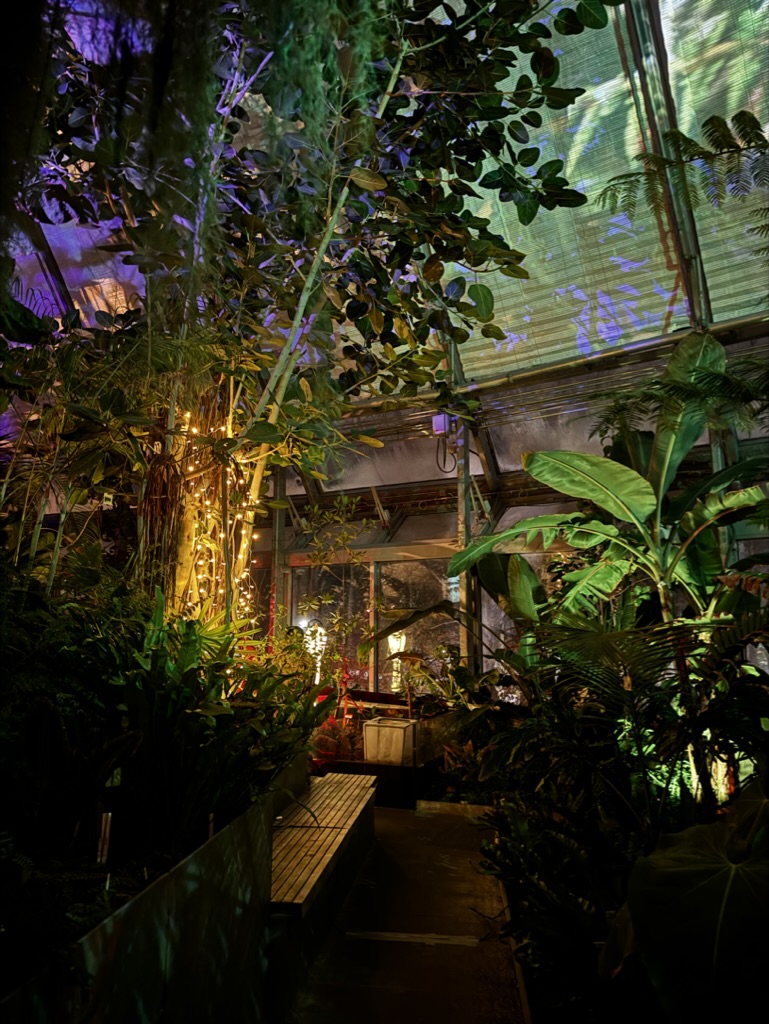The ‘90s were a time of changes for Wellesley. There were issues plaguing the school that would make us roll our eyes now or some that hit too close to home. For example, some major controversies included an out lesbian in an interracial relationship serving as the Resident Director for Dower — some students were moved out of the residential hall because they were “uncomfortable” — and having Barbara Bush as a commencement speaker. Additionally, Wellesley was dealing with a housing shortage, which also involved several students unhoused. Drawing and satirizing events familiar and strange, Jennifer Glass ’93 drew a series of comics during an interesting time in Wellesley’s history and was able to document the Wellesley experience in a comedic lens.
Today, Glass works as an executive director in an engineering forum, and when she is not working on software and technological development, she is able to answer some questions about her life at and post-Wellesley and as a cartoonist.
WN: From what I can gleam, you were a physics major at Wellesley. Do you think that your comics have any connections to your work as a physics student? How did you get into physics and do you have any advice to a physics student (like me!)?
JG: I think I would have liked to do comics regardless of my major, but as it was, they were a nice “non-brain intensive” outlet for me. Clearly my artistic ability was limited, so it’s a good thing I majored in science and not art! I got into physics because I thought I wanted to be a veterinarian, so that put me on the pre-med/pre-vet track. I took intro physics in my first year because I’d just taken it in high school, where I kind of hated it, and I wanted to get the college version of it over with as quickly as possible. I got an A in all of my other classes that first semester but a B in physics, which made me mad. During my winter break after that first semester I went home and spent time doing rounds with the veterinarian at the zoo I’d been a volunteer at in high school, and I discovered that I didn’t want to be a vet after all (pulling maggots out of an egg-bound duck and diagnosing tortoise runny noses turned out not to be so much fun after all). But since I still wasn’t 100% sure I wouldn’t do med/vet school, I went ahead and took the 2nd semester intro physics class anyway. I had a wonderful professor in that class who brought the subject to life, and I discovered classmates who made it fun to hang out solving problem sets in the Science Center at all hours of the night, so I signed up to take another physics class, and then another, and before I knew it I’d turned into a physics major (and got A’s finally!). My advice to physics students would be to find your own niche doing what you really want to do with the skills you learn and don’t assume that you have to walk a purely academic path or a purely theoretical path or a purely experimental path. Learning physics to me is about learning logical problem solving and being able to break complex problems down into their solvable components. Once you learn that skill, you can apply it to just about any field you can imagine. The world is short of logical problem solvers, so if you can take one thing away from the discipline it would be that.
WN: Your comics were funny and topical to the time, yet timeless. I shared them with the news team and we found them relatable (nearly 20 years later!). How were you inspired and what do you think it says about Wellesley that we’re still having the same issues (or laughing at the same things!) Do you think it makes you feel connected to a new generation of students?
I was mostly inspired by whatever was going on at the time, whether it was in my own experiences or things happening in the news around the campus. I recall that I had a grand scheme of weaving longer-term stories into the comics, but mostly it was based on whatever was happening that week (and however close my News due date was!). I am sure some of the things we went through (construction on campus, the dining hall situations, figuring out how to do your laundry) are universal.
WN: From the headlines, some of the controversies Wellesley was dealing with at the time were a lesbian Head of House in Dower, Barbara Bush as a commencement speaker and a housing shortage? What were students’ thoughts and reactions? How do you think Wellesley has changed?
It’s interesting how some things are so different now and some things are still the same (when do we never have a housing shortage?). I remember the Barbara Bush drama quite well, that really roiled the campus (being called “spinster tartlets” by the Boston Globe will do that). There was of course plenty of campus debate, but I thought that in the end the actual commencement address was great in recognizing that the women graduating represented a new world with new expectations. I also remember during that whole drama coming into Stone Hall after class one day and walking to my room, surprised to find that the hallway outside my room was full of cameras, lights and strangers while my neighbor (one of the petitioners) was being interviewed for TV in her dorm room. I watched her calmly answering questions under the Klieg lights, and I was proud of her for standing up for her values and for speaking out, even though it brought her a lot of criticism. I certainly hope that part of Wellesley will never change.
WN: What was your favorite comic to draw? What led you to draw comics for the News? How do you think the News has changed between then and now? How about Wellesley? For better or for worse?
I really liked drawing Wilson the Wellesley Squirrel. One of our Wellesley admission essay questions at the time was something like, “Describe a personality, either current or historical, who inspires you and explain why,” and I wrote my essay on Bill Watterson, the creator of the Calvin and Hobbes comic strip. I like animals and the idea of sharing the world with a speaking version was fun to me. I honestly can’t remember how I ended up doing actual comics for the News, whether I submitted something or if someone just told me there was some blank space they needed to take up, but I was grateful for the opportunity.
Wellesley has changed amazingly over the years. We just had our 25th reunion last year and for one thing the campus is completely transformed – I love the integration of natural habitat into the campus, with the wild grasses and so many more birds and animals than we had back when it was all manicured, mowed lawns. You are very lucky!
WN: As a (very scared) Senior, do you have any advice for us, post-Wellesley?
When you decide what to do after you graduate it will feel like the most momentous decision of your life, because up to that point of your life it probably will be, but it won’t be your last decision. If you end up choosing a path that doesn’t take you where you want to go or if you just choose something because you don’t yet know what you really want to do, it will still be okay because you will have other chances to make other choices. For a lot of us there are forks in the road, U-turns or meandering paths that get us to where we really want to be in life, and that’s okay. You don’t have to get it 100% right the first time.






